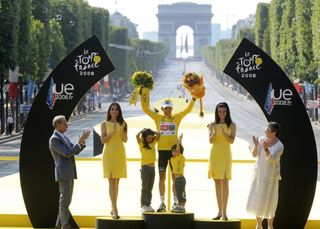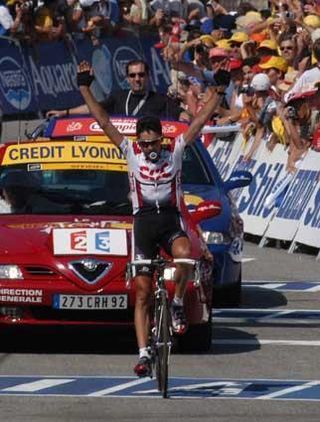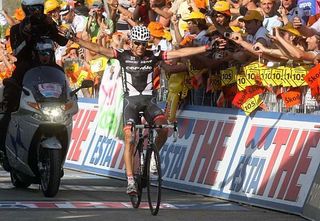Carlos Sastre: Top 10 Career Moments
A look back at the Tour de France winner's career





















Carlos Sastre's career wasn't littered with victories. In fact, the Spaniard had less than a dozen during his 15-year pro career. However, especially during the latter part of that career, Sastre was often centre stage in the major tours at key moments, racking up no fewer than 6 podiums and 15 top 10 finishes in the three-week events that were his forte.

Alpe d’Huez, Tour de France 2008: The crowning moment of Sastre’s career came after he seized the initiative at the foot of the Tour’s most iconic climb. With team-mate Fränk Schleck holding a narrow lead over Cadel Evans and a long time trial to come, CSC boss Bjarne Riis knew it was imperative to gain more time on the Australian. CSC kept the pace high approaching the Alpe, and Sastre seized his opportunity by making the first attack, with the Schleck brothers ready to counter if their Spanish team-mate was chased down. But no concerted response came and Sastre edged inexorably away to finish the stage more than two minutes clear and take the yellow jersey. His 94-second advantage over Evans proved more than enough to enable him to maintain his grip on the maillot jaune all the way into Paris to secure him his sole grand tour title, but in the biggest race of them all.
Plateau de Bonascre (Ax 3 Domaines), Tour de France 2003: Riding in support of CSC leader Tyler Hamilton, Sastre was given a freer rein by Riis after the American cracked his collar-bone, and the Spaniard repaid his team boss’s faith with what is arguably the best-remembered victory of his career. Although memories of Sastre’s attack on the final climb may have dimmed, few will have forgotten his unique celebration as the crossed the line at the summit, pulling his daughter’s dummy out of his back pocket and popping it into his mouth as he claimed what was only the second victory of his career.

Vuelta a España 2000: Sastre got very few opportunities on a ONCE squad that featured so many big-name riders, but took one of those that did come his way when team leader Abraham Olano fell out of contention on Sastre’s first appearance in his national tour. Although he missed out on a stage win, victory in the King of the Mountains competition ahead of Roberto Heras, Roberto Laiseka, Felix Cardenas and Gilberto Simoni demonstrated he could climb with, and often better, than the best. Eighth place overall showed he was consistent too and was the first of 13 top 10 finishes in the major tours.
Tour de France 2006: Sastre was all set to repeat the role of first lieutenant to Ivan Basso that he’d played so impressively at the Giro d’Italia just weeks before when Basso was sidelined from the Tour when the Puerto affair erupted. Suddenly elevated to a role as team leader at CSC, Sastre went on to finish third – following Floyd Landis’s disqualification – and emerged as the race’s strongest rider in the mountains. He went into the final time trial just 12 seconds down on surprise leader Oscar Pereiro, but finished almost five minutes down in 20th place to tumble to fourth overall until the Landis’s positive test boosted him back up to a podium finish.
St Amand Montrond time trial, Tour de France 2008: Although generally classed as a specialist climber, Sastre showed on more than one occasion that he’s no mug as a time triallist, not least when he confirmed his victory on the penultimate day of the 2008 Tour. Going into the 53km test with an advantage of 1-34 on Cadel Evans, the Spaniard only yielded 29 seconds to the Australian, who was still feeling the effects of a crash earlier in the race. Underlining the fact that his strength tended to hold up in the latter part of the three-week stage races, Sastre caught and passed team-mate Fränk Schleck, confirming that the right CSC rider had taken control of the Tour on Alpe d’Huez.
Monte Petrano, Giro d’Italia 2009: Leader of the newly established Cervélo TestTeam, Sastre went into the 2009 Giro aiming for victory. Although he eventually lost out to Denis Menchov, Sastre spiced up the final week of the race with two storming stage wins, the first of them on Monte Petrano. It came at the end of mammoth 230km stage in brutally hot conditions, the kind of day where Sastre’s grittiness was guaranteed to keep him in contention. He made his winning move 6km from the line, quickly dropping the maglia rosa group, and then overhauling Damiano Cunego and Yarslav Popovych as he went clear to win. The victory pushed him up to third overall and back within striking distance of race leader Menchov.
Get The Leadout Newsletter
The latest race content, interviews, features, reviews and expert buying guides, direct to your inbox!
Mount Vesuvius, Giro d’Italia 2009: As quickly as Sastre had ridden himself into contention for the maglia rosa on Monte Petrano, he fell out again with a below-par ride on the Blockhaus. Although disappointed that his GC challenge had fizzled out, the Spaniard reasserted himself with a well-judged victory on the slopes of the volcano that stands above the city of Naples. Sastre’s attack from the maglia rosa group from 9km from home took him across to lone leader Ivan Basso. The two former team-mates stuck together until 5km out, when Sastre pressed again. He later admitted he’d suffered like never before when winning a stage and that at no time did he feel he was the strongest of those in contention for the win. But the dogged Spaniard was not to be denied. The victory moved him up to fourth on GC. He was subsequently promoted to second following the disqualifications of Danilo Di Luca and Franco Pellizotti for doping offences, completing a full set of podium finishes at the grand tours.

Alto del Angliru, Vuelta a España 2011: Sastre’s final season didn’t go as he or his Geox team would have hoped, their failure to secure WorldTour status denying him a farewell appearance at the Tour de France. There was some consolation, though, when he produced a strong ride in support of team-mate Juan José Cobo. In what turned out to be the final race of his career, Sastre’s best moments came late on in typical fashion. The first of them came on the Vuelta’s most devilish ascent, the Angliru. Away in a small group at the foot of the climb, Sastre attacked on the early ramps to get clear on his own. Coming into the steepest sections of the climb, Cobo jumped across to join his veteran team-mate, allowing Sastre to set the pace before Cobo made what proved to be both the stage- and race-winning move.
Andorra Arcalis, Vuelta a España 2000: Sastre rode the Giro in his second season with ONCE, but it was a year later that he first came to prominence with that mountains win at the Vuelta. It was no coincidence that his best day was ONCE’s worst. They started it with Santos González in the leader’s jersey, but the team was primed to defend the interests of Mikel Zarrabeitia and Abraham Olano. Sastre was sent up the road late in the stage to assist his leaders on the final climb, but Zarrabeitia crashed out of the race, while Olano and González lost more than six minutes. That left 24-year-old Sastre with a rare opportunity to ride for himself, and he didn’t disappoint on the final climb. Roberto Laiseka denied him victory, but Sastre took second place ahead of a number of established names, including Santi Blanco, Roberto Heras and Fernando Escartín.
Klasika Primavera 2006: While he was always likely to contend at any grand tour thanks to his strength and durability, Sastre had much less of an impact in one-day races, where his comparative lack of acceleration and almost total absence of a finishing kick left him without an obvious race-winning weapon. His sole one-day victory showed, though, that guile can get you a long way. Up against Damiano Cunego, Joaquim Rodríguez and Alberto Contador coming up to the finish of the Klasika Primavera in the Basque Country, Sastre managed to outwit all three, guessing that none of them would want to chase down his late attack knowing that the other two were likely to come past in the final sprint.
Peter Cossins has written about professional cycling since 1993 and is a contributing editor to Procycling. He is the author of The Monuments: The Grit and the Glory of Cycling's Greatest One-Day Races (Bloomsbury, March 2014) and has translated Christophe Bassons' autobiography, A Clean Break (Bloomsbury, July 2014).